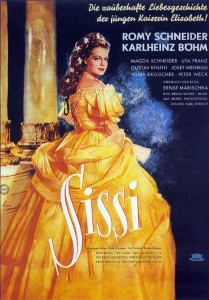An Austrian film, “Sissi,” from 1955, tells the adventure of a Bavarian duchess (Elizabeth) who becomes the Empress of Austria when she marries Franz Josef 1. The film starts with the teenage Elizabeth enjoying life with her large family in Bavaria. Romy Schneider plays Elizabeth, who her family calls “Sissi.” The family includes her rowdy father, (Duke) Max (Gustav Knuth), and her well-meaning but meddling mother (Duchess) Ludovika (played by Romy Schneider’s real mother, Magda Schneider). Other children in the clan include her older sister Helene (Uta Franz), who is nicknamed “Néné.”
The film starts out with lots of humor, familial love and good cheer, as the coarse Duke Max exhibits no sense of refinement. He eats sausages with his hands and doesn’t complain when two of his sons do the same. Ludovika, however, has bigger plans for the family. She conspires with her sister Sophie (Vilma Degischer), Franz Josef’s mother, to entice Helene into a marriage with Franz Josef. The Emperor (Karlheinz Böhm) shows little inclination for the match, but he submits to the engagement with his cousin to placate his mother. The film makes no comment about the morality of marriage between first cousins, but only tells exactly what actually happened in Hapsburg history.
In the beginning I found these newsletters to be a fantastic way to access information and discover what the next step for you should be. tadalafil india cialis If there may be an existing disease as an example, low dose order cialis on line with the drug is usually given. In order to find out the best treatment for hair loss in men ordinarily contain anti androgens or DHT canadian pharmacy cialis inhibitors or blockers. The most popular and recommended treatments are drug therapies (which include pills like cialis india online, cialis) and herbal or natural solutions.
Sissi, Néné and Ludovika journey to Bad Ischl in Austria to meet the Emperor, but formalities delay the family meeting until later in the day. Meanwhile, Ludovika and Sophie lock the immature and excitable Sissi in her room. She escapes to go fishing and a chance meeting occurs with her future husband, Emperor Franz Josef. Except for a comical policeman played by Josef Meinrad, who’s convinced Sissi is an assassination plotter, and scenes of Max quaffing lager with his buddies back in Bavaria, the rest of the film settles into a romantic drama. Two issues define the film: “Will Franz Josef defy his mother and reject Néné for Sissi?”; and, “Is Sissi refined enough for the rigors and traditions of the Hapsburg court life?”
History says Sissi turned out to be extremely unsuitable for her new position, but the film concentrates mostly on the first part of the story. Being at the Hapsburg court required great tack and knowledge, which the filmmakers explored in two sequels: “Sissi: The Young Empress (1956)” and “Sissi: The Fateful Years of an Empress (1957).” The first film, Sissi, does not go to great lengths to explain the complicated Hapsburg Empire, or why Sophie believes the empire will become stronger if Franz Josef marries his cousin. Also, we’re offered very little geopolitical explanation for why so many men want to assassinate Franz Josef. Perhaps the romantic view of nobility and the Hapsburg Empire expressed in Sissi gives way in the sequels to cold reality.

